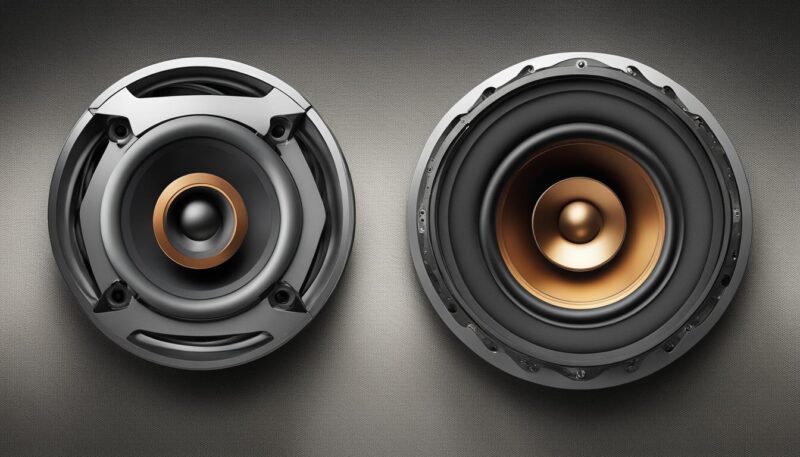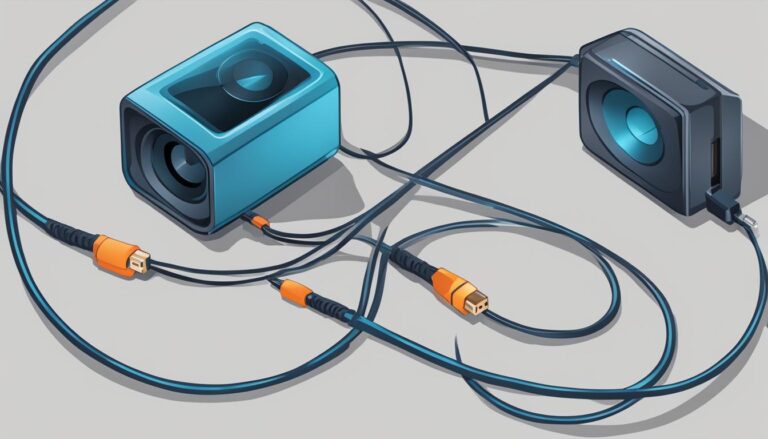Cable Connection vs. Wireless: Which is Better?
When it comes to connecting speakers, you have the option of using a cable connection or going wireless. Each option has its own set of advantages and considerations.
In this article, we will explore the pros and cons of cable connection vs. wireless for speakers to help you determine which option offers the best audio experience for your setup.
Cable Connection vs. Wireless Speakers
| Aspect | Cable Connection | Wireless |
|---|---|---|
| Mobility | Limited mobility due to cable connections | Greater mobility with the freedom to place speakers anywhere |
| Audio Quality | Reliable and consistent audio signal | Potential for interference and audio quality issues |
| Setup Complexity | Minimal setup and easy to connect | May require additional steps for wireless connectivity or Bluetooth pairing |
| Appearance | Visible cables may result in a cluttered setup | Clean and clutter-free look without visible cables |
| Compatibility | Wide range of compatibility with audio sources | Dependent on wireless connectivity options and device compatibility |
The Pros and Cons of Cable Connection
First, let’s discuss the advantages of a cable connection for speakers. A cable connection offers a reliable and consistent audio signal, ensuring high-quality sound reproduction. It eliminates the issues of interference and signal loss that can sometimes occur with wireless connections.
Additionally, a cable connection requires minimal setup and is generally more affordable than wireless options. However, the downside of a cable connection is that it limits mobility and can result in a cluttered setup with wires running between the speakers and the audio source.
If you prioritize a stable and uninterrupted audio experience, a cable connection is the way to go. With a wired setup, you won’t have to worry about signal dropouts or wireless interference that can affect the audio quality. The direct connection ensures a reliable and consistent flow of sound, allowing you to fully enjoy your music, movies, or games without any disruptions.
Furthermore, cable connections are typically more cost-effective than wireless options. You won’t have to invest in additional equipment like wireless transmitters or receivers, saving you money in the long run. The simplicity of a cable connection also means that setup is quick and hassle-free. Just plug in the cables and you’re good to go.
A cable connection offers a reliable and consistent audio signal, ensuring high-quality sound reproduction.
However, it’s important to consider the limitations of a cable connection. The main drawback is the lack of mobility. With cables running between the speakers and the audio source, you may have limited flexibility in speaker placement.
Moving the speakers around or rearranging your space can be cumbersome and may require repositioning the cables each time. Additionally, the presence of cables can create a visually cluttered setup, especially if you have multiple speakers.
Despite the limitations, a cable connection remains a popular choice for those seeking a reliable and cost-effective speaker setup. It offers consistent audio quality and is well-suited for static or fixed speaker configurations where mobility is not a priority.
The Benefits of Wireless Speakers
When it comes to speaker setups, wireless speakers offer a range of benefits that can enhance your audio experience. Let’s explore the advantages of wireless speakers:
Convenient and Flexible Placement
One of the key benefits of wireless speakers is the freedom they provide in terms of placement. Without the need for long and unsightly cables, you can position your speakers anywhere in your space. This flexibility is especially advantageous in larger rooms where running cables can be challenging.
Clean and Clutter-Free Look
Wireless speakers offer a clean and clutter-free aesthetic. With no visible cables, you can achieve a sleek and minimalistic look in your space. This not only enhances the visual appeal but also simplifies the overall setup process.
Potential Audio Quality Issues
While wireless speakers offer convenience, it’s important to consider potential signal interference that may affect audio quality. Factors such as distance, obstructions, and other wireless devices operating in the vicinity can impact the performance of wireless speakers.
Connectivity Limitations and Compatibility
Wireless speakers require a wireless connection or Bluetooth pairing. This dependency on wireless technology can introduce limitations and compatibility issues. It’s essential to ensure that your audio source supports the necessary wireless connectivity for seamless pairing with your wireless speakers.
In summary, wireless speakers provide convenient and flexible placement options, along with a clean and clutter-free look. However, it’s important to be mindful of potential signal interference and compatibility considerations. Before opting for wireless speakers, evaluate your specific needs and preferences to make an informed decision.
Considerations for Audio Quality
When it comes to audio quality, both cable connection and wireless speakers are capable of delivering excellent sound. However, if you prioritize the best audio quality, a cable connection is often the preferred option. A cable connection typically offers a more reliable and consistent signal, minimizing signal degradation that can occur with wireless connections.
Cable connections are particularly beneficial for audiophiles and individuals who value the highest level of audio fidelity. The direct connection between the audio source and the speakers ensures minimal interference and delivers pristine sound reproduction. This setup is ideal for music enthusiasts, professionals, and anyone who wants to experience audio in its purest form.
Even though wireless speakers have made significant advancements in terms of audio quality, they may still face challenges in maintaining a consistently stable connection, especially in environments with a high density of wireless devices.
While the difference in audio quality between cable and wireless connections may not be noticeable to the average listener, audiophiles and discerning listeners may appreciate the subtle nuances and clarity provided by a cable connection.
Ultimately, the best speaker connection for audio quality depends on your personal preferences and requirements. If you want to prioritize the highest level of audio fidelity and reliability, a cable connection is the way to go.
On the other hand, if convenience and flexibility are more important to you, wireless speakers can still provide a satisfactory audio experience.

Factors to Consider for Your Setup
When deciding between a cable connection and wireless speakers, several factors should be taken into account to ensure the best choice for your setup.
- Mobility: Evaluate the importance of mobility in your audio setup. If you frequently move your speakers around, wireless speakers provide the convenience of being able to place them anywhere without the hassle of cables.
- Audio Quality: Consider whether audio quality is a priority for you. If you prioritize superior audio quality and stability, a cable connection is generally recommended. Wired speaker setups offer reliable and consistent audio signals, ensuring minimal signal degradation.
- Compatibility: Take into consideration the compatibility of your audio source and the available speaker connectivity options. Some audio devices may only support a specific type of connection, which could influence your decision. Make sure to choose a setup that is compatible with your existing audio equipment.
By considering these factors, you can make an informed decision on whether a wired or wireless speaker setup is the right choice for your specific needs.

Conclusion
In conclusion, when deciding between cable connection and wireless speakers, it’s essential to consider your specific needs and priorities. Cable connection offers consistent audio quality and reliability, making it the ideal choice for audiophiles and individuals seeking the highest level of audio fidelity. On the other hand, wireless speakers provide convenience and flexibility, allowing you to place the speakers anywhere without dealing with cable clutter.
To make an informed decision, take into account your setup, audio quality requirements, and mobility needs. If you prioritize a fixed setup and value superior audio quality, cable connection is recommended. However, if you frequently move your speakers or prefer a wireless setup, wireless speakers are a suitable choice.
Ultimately, both options have their own unique benefits. Choose the one that best aligns with your preferences and requirements. Whether you opt for the reliability of a cable connection or the convenience of wireless speakers, the goal is to enhance your audio experience and enjoy immersive sound in your space.
FAQs
What are the advantages of a cable connection?
A cable connection offers a reliable and consistent audio signal, ensuring high-quality sound reproduction. It eliminates the issues of interference and signal loss that can sometimes occur with wireless connections.
What are the benefits of wireless connections?
Wireless connections offer a convenient and flexible audio solution. They allow you to place your audio equipment anywhere in your space without the need for long cables. This provides greater freedom and flexibility in placement, especially in larger rooms.
What factors should I consider when choosing between cable connection and wireless speakers?
When choosing between cable connection and wireless speakers, consider factors such as your specific setup, mobility requirements, and audio quality preferences. Evaluate if you need the flexibility to move the speakers frequently or if you prefer a more fixed setup with prioritized audio quality.
Can I use both cable connection and wireless speakers in my setup?
Yes, it is possible to use both cable connection and wireless speakers in your setup. This allows you to have a combination of fixed speakers using cable connections and portable speakers using wireless technology.
Are wireless speakers subject to signal interference?
Yes, wireless speakers may experience signal interference, potentially resulting in audio quality issues. Signal interference can occur in environments with a high density of wireless devices or obstacles that block the wireless signal. However, advancements in wireless technology have reduced these issues in recent years.
Our Mission: At AudioInspects, we are dedicated to providing the most comprehensive and authentic reviews of audio equipment on the market. We conduct independent testing and research of products, so you can make an informed decision before making a purchase. Our mission is to help you find the best audio equipment to improve your listening experience. So trust us to deliver the most reliable recommendations and advice.
Disclosure: When you do decide to make a purchase through our links, please note that we may earn a commission, but this does not affect the honesty of our reviews. You can read our affiliate disclosure in our Disclosure.


![Top Coaxial Speaker Cables in 2023 [Buying Guide]](https://audioinspects.com/wp-content/uploads/2022/05/sound-connectors-included-in-the-audio-mixer-close-2021-09-02-08-00-14-utc-768x512.jpeg)
